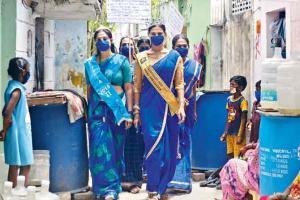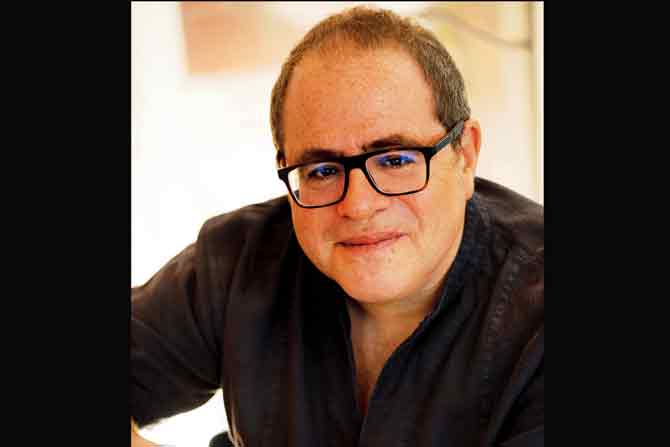
Members of the transgender community walk through a residential area during a COVID-19 awareness rally in Chennai on July 8. In his book, Gevisser documents the transgenders of Cuddalore, Tamil Nadu. PIC/Getty Images
He didn't swoop in and swoop out in typical journalistic fashion. Instead, South African journalist Mark Gevisser chose to interact with his subjects over the course of seven years. Gevisser spoke to people from all over the world, be it Egypt, India, Kenya, Nigeria, Palestine, Russia, Uganda or the USA. The result is his deeply personal yet political book, The Pink Line: Journeys Across the World's Queer Frontiers (HarperCollins Publishers India).
ADVERTISEMENT
Edited excerpts from the interview.
Why did you decide to look at the world through the lens of sexuality and gender identity?
I started thinking about this book around 2010 as I watched a new global discussion that was describing—and dividing—the world in an entirely unexpected way. I came to see this new global human rights frontier as a Pink Line, with battles along it as a new form of culture wars. On the one side are countries or communities that have come to accept queer people as full members of society, and on the other side are those finding new ways to shut them out. The Pink Line is constantly shifting, and not only separates countries, but runs through parliaments and courtrooms, through bedrooms and bathrooms, through bodies themselves, as the world comes to terms with new ways of understanding what it means to make a family, to be male or female, or to have human rights.
How did you build a rapport with the diverse set of people you interacted with, despite the language barrier?
I can use my Cuddalore experience to talk about this. My friend and a journalist, Vikram Doctor, suggested I visit Chennai because of the way Tamil Nadu has been at the forefront of transgender rights. On that trip, my researcher and interpreter Lavanya Keshavraj said that she was worried I was only getting the urban perspective, and insisted on taking me on a road-trip south! We stopped at an AIDS initiative in Cuddalore, where we met a young woman named Lakshaya. She told us about the temple she and her fellow 'kothis' (a Hijra slang word meaning sexual bottom) had set up in a nearby fishing village, to worship the goddess Angala amman.

Mark Gevisser
I do not speak a word of Tamil and when I first met them, they didn't speak a word of English. Lavanya speaks a university-educated, standard English. She did a great job, but there were some consequences. Lakshaya's English sounds very smooth, while her boss, Sheetal, sounds coarser. This is because Sheetal chose to speak to me in English, her third language. Does this mean Lakshaya is 'smoother' than Sheetal? Yes and no. Lakshaya has a more gracious character than Sheetal, who can be quite blunt. But it's also because of the translation. Translation is a screen, and not always a translucent one.
With respect to India, what are some of the changes you've noticed from the first time you visited it in 2012 to the present day scenario?
By the time I arrived in India in 2012, the country had already taken major steps in opening up to queer people. I loved hearing a story about how Infosys had actually poached talent from Google by offering a top software engineer free transition surgery if she moved. This is all a result, I believe, of the magnificent movement to get Article 377 of the Indian Penal Code removed.
More recently, I have been deeply struck by the way the transgender movement has taken root in India, building on both the gay movement and, of course, the lived experiences of India's huge trans population. The recent debates over trans rights in India have also been distressing—particularly the government's refusal to implement the Supreme Court's ruling on self-determination for trans people (being able to define themselves without external certification). But it's been inspiring to see how a political movement has risen to challenge this.
That being said, I do not want to underestimate the difficulties and violence that queer Indians still experience. I'll never forget something that Mohana, one of the Cuddalore 'kothis' (or TGs, as they now call themselves), said to me when I asked her how she feels about the decriminalisation of homosexuality. She scoffed: "Please! We have nothing to fear from the law. We know how to deal with the police. That's not the problem. The problem is family!" Indeed, at this very moment, Mohana is contemplating an unwanted marriage to a woman, at her family's insistence.
Catch up on all the latest Mumbai news, crime news, current affairs, and a complete guide from food to things to do and events across Mumbai. Also download the new mid-day Android and iOS apps to get latest updates.
Mid-Day is now on Telegram. Click here to join our channel (@middayinfomedialtd) and stay updated with the latest news
 Subscribe today by clicking the link and stay updated with the latest news!" Click here!
Subscribe today by clicking the link and stay updated with the latest news!" Click here!






